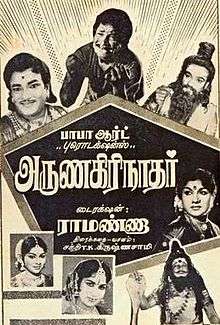Arunagirinathar (film)
for 1964 film based on his history, see Arunagirinathar
| Arunagirinathar | |
|---|---|
 Poster | |
| Directed by | T. R. Ramanna |
| Produced by | B. S. Moorthy |
| Written by | Sakthi T. K. Krishnasamy |
| Starring |
T. M. Soundararajan M. R. Radha B. S. Saroja C. Lakshmi Rajyam Sharadha |
| Music by |
G. Ramanathan T. R. Papa |
| Cinematography | G. K. Ramu |
| Edited by | D. K. Shankar |
Production company |
Baba Arts Productions |
| Distributed by | Baba Arts Productions |
Release dates | 7 February 1964 |
Running time | 120 mins |
| Country | India |
| Language | Tamil |
Arunagirinathar is a 1964 Tamil biographical film directed by T. R. Ramanna and produced by B. S. Moorthy. The film's script was written by Sakthi T. K. Krishnasamy.[1] Soundtrack was composed by G. Ramanathan and T. R. Papa. The film stars T. M. Soundararajan in Title role with M. R. Radha, B. S. Saroja , Sharadha, C. Lakshmi Rajyam and Master Raghunath portraying supporting role.[2]
Plot
Arunagiri (T. M. Soundararajan) was born in Tiruvannamalai. Arunagiri was attracted to the pleasure of the flesh and spent his youth in pursuing life of debauchery. His sister Aadhi Lakshmi (B. S. Saroja) always gave what ever she earned to make her brother happy and he frequented devadasi Maragatham(C. Lakshmi Rajyam). his sister tries to reform her brother Arunagiri, so she was arranged marriage for Gnana Valli (Sharadha). But arunagiri was feel about his unhappy married life. It was said since he was enjoying life luxuriously, he started to suffer Leprosy and people started avoiding him.
There came a time when his sister had no money to meet his demands. She said that he should sell her in order to have money or who offers herself to him when no consequence of his depraved lifestyle. This shocks to him to the core and changes his outlook. He attempts suicide by jumping off a temple tower when Lord Muruga disguised as a Brahmin saves him, shows him to path of devotion and initiates him to compose the Thirupugazh, an anthology of songs dedicates to Muruga.[2]
Cast
- T. M. Soundararajan as Arunagirinathar
- Master Sridhar as Young age Arunagirinathar
- M. R. Radha as Samanthandam
- B. S. Saroja as Aadhi Lakshmi
- Sharadha as Gnana Valli
- C. Lakshmi Rajyam as Maragatham
- R. S. Manohar as Tamil Pandit
- Master Raghunath as Lord Murugan
- Angamuthu as Maragatham's Mother
- N. S. Kolappan as Annamalai
Crew
- Director = T. R. Ramanna
- Producer = B. S. Moorthy
- Script = Sakthi T. K. Krishnamoorthy
- Art = Selvaraj
- Stills = Nagai Peter Johns
- Processing = S. Ranganathan by Vijya Lab
- Audiography(song) = Jeeva, T. S. Rangasamy and J. J. Manikkam
- Audiography(dialog) = C. V. Ramanan
- Choreography = Muthusamy, B. S. Moorthy, Ramasamy and Thangaraj
- Studio = Vijaya - Vahini and Venus - Syamala.[2]
Reception
The familiar tale of Arunagirinathar had been made into a film twice in 1937 and was produced for the third time in 1964 after nearly decades by noted T. R. Ramanna for Baba Art Productions.Sharadha , the multilingual actress played his wife and M. R. Radha and R. S. Manohar played two egoistic persons who face defeat at the hands of the saint. C. Lakshmi Rajyam a dancer played at the vamp. The brilliant music and particular the hymn Muthai Tharu.[2]
Soundtrack
| Arunagirinathar | |
|---|---|
| Soundtrack album by G. Ramanathan and T. R. Papa | |
| Released | 1964 |
| Recorded | 1964 |
| Genre | Devotional |
| Length | 33:18 |
| Language | Tamil |
| Producer | G. Ramanathan and T. R. Papa |
Music Composed by G. Ramanathan and T. R. Papa. Lyrics written by T. K. Krishnasamy.[3] Randor Guy stated The hindu The first offering begins with Muthai Tharu this hymn with tongue - twisting lyrics in Tamil is difficult events read at leisure and T. M. Soundararajan created history by recording it in a single take! composed in raaga Shanmugapriya.
T. M. Soundararajan recalls that the tune was composed by T. R. Papa and before the recording he called on the religious servant Kirupanandha Variyar who translated every word of the song and T. M. Soundararajan had rehearsals for an entire day before he recorded it. An amazing performance indeeded, not surprisingly the song is one of the immortal melodies of Tamil cinema.[2]
| No | Song | Singer | Lyrics | Length(m:ss) |
|---|---|---|---|---|
| 1 | Aadavendum Mayile | T. M. Soundararajan S. Janaki | T. K. Krishnasamy | 4:03 |
| 2 | Nilavo Aval | T. M. Soundararajan P. Suseela | 3:23 | |
| 3 | Penn Pirantha Pavathai | P. Suseela | 3:28 | |
| 4 | Muthai Tharu | T. M. Soundararajan | 4:10 | |
| 5 | Senkol Ezh Adthu | T. M. Soundararajan | 6:11 | |
| 6 | Ven Kudai Viruthu | T. M. Soundararajan | 1:13 | |
| 7 | Thandayani Vendayam | T. M. Soundararajan | 2:56 | |
| 8 | Pakkarai Vichitharamani | T. M. Soundararajan | 2:40 | |
| 9 | Yethanai Piravi Petru | T. M. Soundararajan | 3:32 | |
| 10 | Santhaana Pushpa | T. M. Soundararajan | 3:10 | |
| 11 | Aadum Parivel | T. M. Soundararajan | 1:24 | |
| 12 | Amma Deivam Agivittal | L. R. Eswari |
See also
References
- ↑ http://thamizhisai.com/tamil-cinema/tamil-cinema-001/arunagirinathar.php/
- 1 2 3 4 5 Randor Guy (13 October 2012). "Blast from the past - Arunagirinathar 1964". "The Hindu". Retrieved 2015-12-15.
- ↑ "arunagirinathar songs". gaana. Retrieved 2015-12-15.
External links
- Arunagirinathar, YouTube
- Arunagirinathar Tamil film Songs